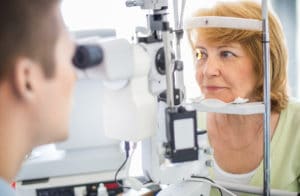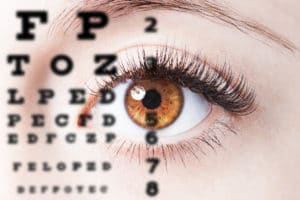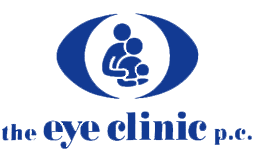Eye Exam Portland OR

We provide comprehensive eye care to patients of all ages. Our doctors are fully trained and experienced to diagnose, treat and prevent conditions from myopia and hyperopia to glaucoma, cataracts and everything in between.
We strive to provide our patients with safe, minimally invasive treatments to effectively relieve symptoms and preserve vision and overall eye health. As a comprehensive ophthalmology practice, our services include not only laser vision correction and small-incision cataract surgery but also treatments for a range of conditions such as glaucoma, the diabetic eye, dry eye and macular degeneration.
See What Our Patients Are Saying:
“Dr. John Wilkins is one of the best ophthalmologists in Portland and maybe even the world. I’ve been seeing him for over two thirds of my life and highly recommend him!” -Tara R.
Eye exams are an invaluable tool in maintaining your eyes’ health by detecting and preventing disease. Some diseases develop slowly without causing pain or vision loss. Early detection of any problems can reduce the risk of further harm and allow for a choice of treatment options. We regularly screen for diseases such as glaucoma and diabetic retinopathy, which can develop without any noticeable symptoms.
Scheduling Your Exam
 Patients should see their doctor for a comprehensive eye exam every one to three years, depending on their age, risk of disease and overall physical condition. Children should have regular tests to ensure the proper development of their vision and prevent any interference with their academic achievements. Older adults are often at a higher risk for eye conditions such as glaucoma, macular degeneration and cataracts. Even if your eyes are healthy, you should still have a regular eye exam to detect any problems as soon as possible and begin necessary treatment. We invite you to contact one of our Portland locations today to schedule your eye exam by either calling or submitting a contact form.
Patients should see their doctor for a comprehensive eye exam every one to three years, depending on their age, risk of disease and overall physical condition. Children should have regular tests to ensure the proper development of their vision and prevent any interference with their academic achievements. Older adults are often at a higher risk for eye conditions such as glaucoma, macular degeneration and cataracts. Even if your eyes are healthy, you should still have a regular eye exam to detect any problems as soon as possible and begin necessary treatment. We invite you to contact one of our Portland locations today to schedule your eye exam by either calling or submitting a contact form.
What Does a comprehensive eye exam Involve?
 A comprehensive eye exam involves a series of tests to evaluate your vision and check for eye diseases. At The Eye Clinic, our ophthalmologists will use a variety of instruments, have you look through a variety of changing lenses, shine bright lights at your eyes, and even hit your eyeball with a puff of wind. The goal of each of these tests is to evaluate a different aspect of your vision quality or the health of your eyes.
A comprehensive eye exam involves a series of tests to evaluate your vision and check for eye diseases. At The Eye Clinic, our ophthalmologists will use a variety of instruments, have you look through a variety of changing lenses, shine bright lights at your eyes, and even hit your eyeball with a puff of wind. The goal of each of these tests is to evaluate a different aspect of your vision quality or the health of your eyes.
The key is to not just rate your vision, such as 20/20 and the like, but to also catch any eye problems as early as possible. This is because many eye conditions and diseases don’t exhibit symptoms until they have already caused vision damage.
What Can I Expect At My Eye Exam?
- Visual Acuity Test – This uses an alphabet eye chart, also called the Snellen chart. You read the letters that get progressively smaller the farther down you read.
- Refraction Assessment – As light rays enter the front of your eyes, they are bent as they reach the retina in the back of the eye. If the light rays aren’t focused properly, you have a refractive error. Glasses or contact lenses correct these errors. To fine tune the amount of error and correction we use a phoropter, where alternate lenses are rotated in front of your eyes to find which correction gives you the best vision.
- Eye Muscle Test – You simply follow an object and we watch your eye movements to check for muscle weakness, poor control, or poor coordination between eyes.
- Vision Field Test – This determines if you have difficulty seeing in any areas of your overall field of vision. We use an automated perimetry machine where you look at a screen with blinking lights on it. You press a button each time you see a blink.
- Color Vision Test – To test for any color vision problems, we show you several multicolored dot-pattern tests. There are numbers and shapes within the dot patterns. If you can’t see certain colors, you won’t see the numbers/shapes in the dots.
- Slit-lamp Examination – The slit lamp is a microscope that illuminates and magnifies the front of your eye. We examine your eyelids, lashes, cornea, iris, lens, and the fluid chamber in your eye.
- Retinal Examination – Sometimes called funduscopy or ophthalmoscopy, this is the examination of the back of your eye, where the retina, optic disc, and various blood vessels are found. For this exam, we usually dilate your eye with eyedrops. These keep the pupil from getting smaller when a light is shown on it.
- Glaucoma Screening – Glaucoma is a disease where pressure builds inside your eyeball, intraocular pressure. This pressure damages the optic nerve and your vision. For this test, we usually use a puff of air shot onto the front of the eye. This measures the pressure in the eye.
Call to Schedule Your Appointment
What Can an Eye Exam Tell About Your Health?
Your eyes can be very telling about your overall health and wellness. While there are numerous conditions that a doctor may detect during a dilated eye exam, the most common include:
- Diabetes
- High blood pressure
- Heart disease
- High cholesterol
- Lupus
- Lyme disease
- Multiple sclerosis
- Rheumatoid arthritis
- Stroke risk
- Vascular disease
Are My Eyes at Risk?
The general answer is that, yes, your eyes are at risk of at least some types of eye conditions. Because your eyes are exposed to environmental factors, there is a risk of injury or debris getting into the eye. Because your eyes are exposed to ultraviolet light in sunshine, there is a risk of cataract formation later in life. If you have a health condition like diabetes, you are at risk of developing conditions like diabetic retinopathy. The aging process alone creates risks for various conditions and diseases that affect the eyes. For this reason, it is important to make routine eye exams with a board-certified ophthalmologist a priority. The examinations that our doctors perform look beyond your vision and closely observe all of the structures in the eye, including the quality of the vitreous fluid and the health of the optic nerve at the very back of the eye.
How to Prepare for an Eye Exam?
If you’ve never had a comprehensive eye exam in which your eyes were dilated, we suggest that you have a friend or loved one accompany you to your appointment. Your eyes may be sensitive for some time after your appointment, and it would be helpful to have someone drive you home. Your eye doctor will want to know about any changes to your vision, and any potential abnormalities that you’re experiencing. Because you experience them, possibly often, they may not feel abnormal to you. Some of the conditions that your doctor will want to know about include seeing specks float across your field of vision, seeing flashes of light when you blink or at other times, having poor night vision, or seeing halos around light sources. The information that you provide during your consultation and examination helps your ophthalmologist better understand your overall eye health as it relates to your general health, work, lifestyle, and other factors.
If you wear eyeglasses or contact lenses, bring them to your appointment. Your doctor may review your current prescription as one way to measure changes in your vision over time. Also be aware of your family history as it pertains to eye health, if that information is available to you. Finally, jot down a list of the medications and supplements that you take. The night before your eye exam, avoid alcohol consumption and try to get a good night’s sleep. Also limit or refrain from computer use and digital screentime before your eye exam. Ideally, your eyes should be rested and ready for accurate measurements of your vision, intraocular pressure, and other functions.
Who Conducts Eye Exams?
At our Portland eye clinic, eye exams are performed by one of our experienced, board-certified ophthalmologists. Eye exams are often also performed by optometrists. However, an ophthalmologist is an eye doctor that has extensive training in visual function as well as the various conditions and diseases that may develop. When you have an eye exam by an ophthalmologist, your entire eye, from your lense to your cornea to your optic nerve, will be examined.
What Are Some Easy Ways to Improve Vision?
Your vision is affected by your sleep, your diet, and your general health. By sleeping, eating, and living for general health, you are supporting your eyes as you age. The habits that you develop now may not improve your vision, per se, but can slow the progression of visual decline and the risk of developing an age-related eye disease like glaucoma. To eat for eye health, focus on fresh vegetables, leafy greens, and fruits that contain antioxidants and carotinoids. Exercise is good for your eyes because it helps improve metabolic function and insulin regulation, decreasing the risk of diabetes and diabetic retinopathy. Your eyes need to be protected from harmful UV rays, which you can do by wearing sunglasses when you go outdoors. Finally, as you may suspect, you can support eye health by limiting screen time to the bare minimum. When using a computer or other device, it is necessary to look away from the screen every few minutes to allow your eyes to rest on an object across the room.
How Often Should I Have An Eye Exam
This depends on your age, and your risk for developing eye problems. These are the general guidelines:
-
- Children 5 years and younger – Children under three should see a pediatric ophthalmologist to check for the most common eye problems, such as lazy eye.
- School-age children and teens – Your child needs his or her vision checked before they enter first grade. From there, vision should be checked every one or two years to be sure their refraction/vision correction prescription hasn’t changed.
- Adults – If you don’t have vision problems and don’t have a family history of eye disease, this is the schedule for adults:
– Every five to 10 years in your 20s and 30s
– Every two to four years from 40 to 54
– Every one to three years from 55 to 64
– Every year after age 65
These adult numbers should increase in frequency if you wear glasses or contact lenses, if you have a family history of eye disease, or if you have a chronic disease that can affect your eyes, such as diabetes.
Why Do I need More Frequent Exams After I turn 40?
Certain eye diseases tend to develop after a person turns 40. You can have the beginnings of any of these diseases without having any noticeable symptoms, but we can spot all of them during your routine eye exam. These are the diseases that develop after the age of 40:
Without exception, catching and treating these diseases early impacts how effective we can be at stopping or at least delaying the progress of the disease. But if don’t come in for your regular eye exams, these diseases can begin to damage your eyes before we get a chance to see them.
What is pupil dilation?
We dilate your pupils when we examine the retina at the back of your eye. These eyedrops keep your pupil from getting smaller when we shine a light into your eye. This enables us to see the back of the eye much better. In a direct retinal exam, we use an ophthalmoscope to shine a beam of light through the pupil to see the back of the eye. In an indirect exam, we examine the inside of the eye while wearing a condensing lens with a mounted bright light attached. This allows us to see the retina and associated structures in great detail and in three dimensions.
How Long Does An Eye Exam Take?
A regular eye exam with the team at The Eye Clinic takes around one hour.
Are There Questions I should Ask During My Exam?
Once you schedule your routine eye exam with us at The Eye Clinic, you can ask if we will dilate your eyes or not. Also ask us if you need to bring your current eyeglasses or contact lenses with you.
During the exams, there are no dumb questions, but you may want to ask some or all of these things, if they are applicable:
- At what age should I start to have my children come in for regular eye exams?
- Given my age, eye condition, and family background, how often should I have a routine eye exam?
- What lens designs and options are a good fit for my refraction errors?
- Can my glasses block UV rays?
- Do my current sunglasses protect my eyes from UV rays?
- What are photochromic lenses and would they work for me?
Schedule Your Eye Exams In Portland, OR!
We invite you to contact us today to schedule your next Eye Exam at either of our Portland area offices. Our expert staff looks forward to meeting you!


